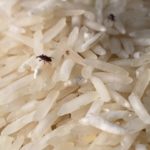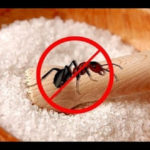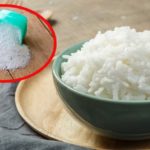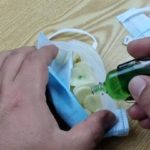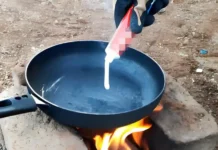In addition to its primary use of cleaning laundry, detergent powder has a variety of alternative applications:
Moisture Absorber: Detergent powder is highly absorbent and can be used to eliminate excess moisture from areas like kitchen cabinets and shoe closets.
Floor Cleaner: Diluted detergent powder can be safely used to mop your floors, including wooden surfaces, without causing any damage.
Lubricant: In the absence of grease, a diluted solution of detergent powder can be used to lubricate items like hinges and windows around the house.
Kitchen Wall Cleaner: When specialized cleaning products run out, detergent powder diluted with water can be an effective alternative to quickly clean kitchen walls.
Additionally, detergent powder can be used as an insecticide to protect your plants.

Instructions for using detergent powder as an insecticide
To utilize detergent powder as an insecticide, follow one of these two methods:
– Method 1: Mix one spoonful of detergent powder with four liters of water and spray it on your plants and flowers every two weeks. This mixture effectively removes whiteflies and bacteria surrounding your plants.
– Method 2: Combine detergent powder with one spoonful of urea to eradicate aphids.
Soap has been traditionally used as a pesticide due to its ability to disrupt the protective coating of insects, leading to dehydration and death.
To create an insecticidal soap, fatty acids are combined with soap. The safe concentration for insecticidal soap consists of 50% potassium salts of fatty acids derived from vegetable and animal oils.
Try out this tip for using detergent powder as an insecticide and observe its effectiveness.
Alternative methods for pest control
– Chili Powder: Chili powder is an excellent irritant and insecticide. To prepare this mixture, blend chili powder with detergent powder and an appropriate amount of cooking oil. Then, dilute it with water and apply directly to the areas affected by pests.
– Smoke: Burning leaves, such as eucalyptus, creates smoke that effectively repels insects and other pests without the need for a large fire.
– LED Lights: Research indicates that all types of light attract insects, with LED lights proving to be even more attractive than traditional light sources.
– Chili, Garlic, and Ginger Solution: Spices like chili, garlic, and ginger contain high levels of acids that can affect the eyes and skin of insects. To prepare this solution, finely chop equal amounts of chili, garlic, and ginger, and then soak them in three liters of alcohol for about 15 days. When ready to use, mix 200ml of the solution with 12 liters of water for every ‘sào’ (a Vietnamese unit of area). This organic pesticide can be stored for up to four to five months.
– Marigold Tea: Marigolds contain a potent plant chemical called pyrethrin, which interferes with the nervous system of insects, rendering them inactive. To make a marigold insecticide, boil 100 grams of dried marigold flowers in one liter of water for 20 minutes. Strain the liquid, allow it to cool, and then pour it into a spray bottle. This pesticide is effective against cold-blooded creatures, insects, and invertebrates. It can be stored for up to two months. For increased potency, consider adding wood oil.
According to VTC News

























